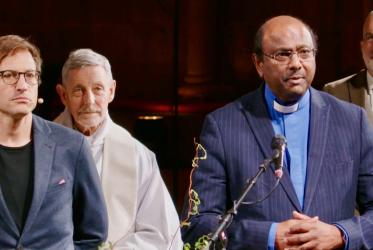“Once, the Mediterranean Sea was called ‘the lake of peace’,” said Dr Tarek Mitri of Lebanon at a recent conference promoting a coordinated response to massive migration in Europe. "Today, we find it is a lake of tears, fears and dangers.”
“The Mediterranean exodus,” Mitri observed, “highlights the failure of the international community – the failure not just of European countries but of Arabs as well.”
There are 4 million refugees from the Syrian civil war currently registered in the Middle Eastern region alone, Mitri reported, and an increasing number of them attempt to flee to Europe, by whatever means they deem necessary. Refugees and other migrants from the Middle East and parts of Africa fall prey to smugglers who contract to convey them to Europe from Turkey and North African points of departure that include Libya.
Focussing on his own country, Mitri noted that approximately one-quarter of the population in Lebanon is comprised of Syrian refugees. Only 10% of these refugees’ children are in school; 25% are illiterate; 70% of refugees are living below the poverty line. There are few if any employment opportunities, the government is able to offer only limited financial support, “and solidarity falls away as conditions deteriorate.” As a result, many Syrian refugees “are being pushed underground, to an undocumented status.”
Despite the financial burden, Mitri added, “Lebanon will not return refugees to a place where they will be maltreated.” Still, many look to Europe as a place of greater opportunity for integration.
Tarek Mitri, a professor and director of the institute for public policy and international relations at the American University in Beirut, spoke in a discussion during the 18-19 January conference in Geneva on the refugee and migrant crisis in Europe. The event was co-sponsored by the World Council of Churches (WCC) and three United Nations (UN) agencies, UNICEF, UNFPA and UNHCR.
A former member of the WCC staff in Geneva specializing in international affairs and inter-religious cooperation, in 2005 Mitri was called back to Lebanon to serve as a senior minister in a series of successive governments. From 2012 to 2014, he was Ban Ki Moon’s special representative and head of the UN Special Mission in Libya.
Participants in the Geneva conference authorized a final statement asserting that “alleviating the suffering of people affected by displacement is a shared responsibility, not only in Europe but also elsewhere. It is vital that government, civil society, international agencies and others work together in a consistent and coordinated manner to provide a safe and humane environment for refugees and migrants, and to meet the immediate needs of people escaping war, generalized violence and oppression -– and over the longer term to facilitate inclusion and integration.”
To this end, agencies and organizations affirming the statement will meet again “on a quarterly basis to review and share progress in addressing issues raised at this conference.”
Conference underlines need for greater cooperation in refugee and migrant crisis (WCC press release of 19 January)
WCC/UN conference calls for coordinated action on refugee crisis (WCC press release of 20 January)







